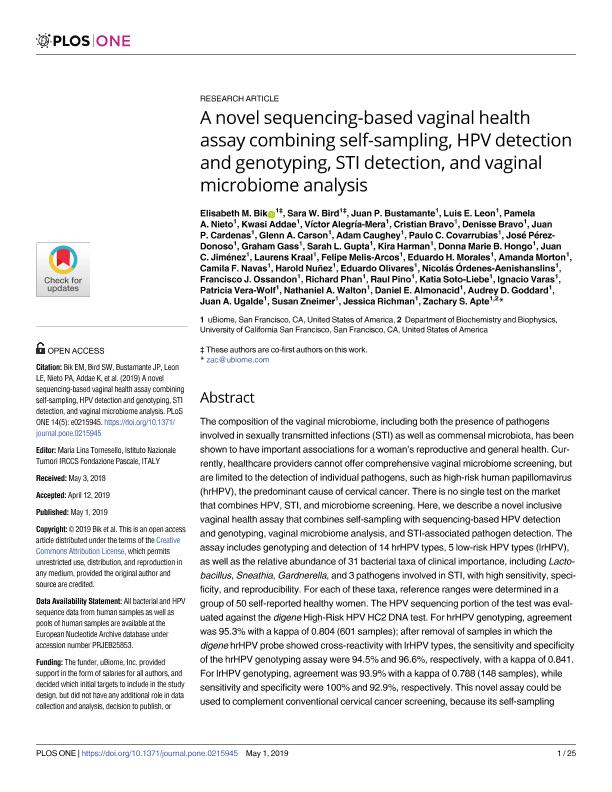Mostrar el registro sencillo del ítem
dc.contributor.author
Bik, Elisabeth M.
dc.contributor.author
Bird, Sara W.
dc.contributor.author
Bustamante, Juan Pablo

dc.contributor.author
Leon, Luis E.
dc.date.available
2020-06-06T22:39:08Z
dc.date.issued
2019-05
dc.identifier.citation
Bik, Elisabeth M.; Bird, Sara W.; Bustamante, Juan Pablo; Leon, Luis E.; A novel sequencing-based vaginal health assay combining self-sampling, HPV detection and genotyping, STI detection, and vaginal microbiome analysis; Public Library of Science; Plos One; 14; 5; 5-2019
dc.identifier.issn
1932-6203
dc.identifier.uri
http://hdl.handle.net/11336/106808
dc.description.abstract
The composition of the vaginal microbiome, including both the presence of pathogens involved in sexually transmitted infections (STI) as well as commensal microbiota, has been shown to have important associations for a woman´s reproductive and general health. Currently, healthcare providers cannot offer comprehensive vaginal microbiome screening, but are limited to the detection of individual pathogens, such as high-risk human papillomavirus (hrHPV), the predominant cause of cervical cancer. There is no single test on the market that combines HPV, STI, and microbiome screening. Here, we describe a novel inclusive vaginal health assay that combines self-sampling with sequencing-based HPV detection and genotyping, vaginal microbiome analysis, and STI-associated pathogen detection. The assay includes genotyping and detection of 14 hrHPV types, 5 low-risk HPV types (lrHPV), as well as the relative abundance of 31 bacterial taxa of clinical importance, including Lactobacillus, Sneathia, Gardnerella, and 3 pathogens involved in STI, with high sensitivity, specificity, and reproducibility. For each of these taxa, reference ranges were determined in a group of 50 self-reported healthy women. The HPV sequencing portion of the test was evaluated against the digene High-Risk HPV HC2 DNA test. For hrHPV genotyping, agreement was 95.3% with a kappa of 0.804 (601 samples); after removal of samples in which the digene hrHPV probe showed cross-reactivity with lrHPV types, the sensitivity and specificity of the hrHPV genotyping assay were 94.5% and 96.6%, respectively, with a kappa of 0.841. For lrHPV genotyping, agreement was 93.9% with a kappa of 0.788 (148 samples), while sensitivity and specificity were 100% and 92.9%, respectively. This novel assay could be used to complement conventional cervical cancer screening, because its self-sampling format can expand access among women who would otherwise not participate, and because of its additional information about the composition of the vaginal microbiome and the presence of pathogens.
dc.format
application/pdf
dc.language.iso
eng
dc.publisher
Public Library of Science

dc.rights
info:eu-repo/semantics/openAccess
dc.rights.uri
https://creativecommons.org/licenses/by-nc-sa/2.5/ar/
dc.subject
MICROBIOME
dc.subject
VAGINAL HEALTH ASSAY
dc.subject
HPV DETECTION
dc.subject
VAGINAL MICROBIOME ANALYSIS
dc.subject.classification
Otras Ciencias de la Salud

dc.subject.classification
Ciencias de la Salud

dc.subject.classification
CIENCIAS MÉDICAS Y DE LA SALUD

dc.title
A novel sequencing-based vaginal health assay combining self-sampling, HPV detection and genotyping, STI detection, and vaginal microbiome analysis
dc.type
info:eu-repo/semantics/article
dc.type
info:ar-repo/semantics/artículo
dc.type
info:eu-repo/semantics/publishedVersion
dc.date.updated
2020-06-01T13:39:54Z
dc.journal.volume
14
dc.journal.number
5
dc.journal.pais
Estados Unidos

dc.journal.ciudad
San Francisco
dc.description.fil
Fil: Bik, Elisabeth M.. Ubiome;
dc.description.fil
Fil: Bird, Sara W.. Ubiome;
dc.description.fil
Fil: Bustamante, Juan Pablo. Universidad Nacional de Entre Ríos. Instituto de Investigación y Desarrollo en Bioingeniería y Bioinformática - Consejo Nacional de Investigaciones Científicas y Técnicas. Centro Científico Tecnológico Conicet - Santa Fe. Instituto de Investigación y Desarrollo en Bioingeniería y Bioinformática; Argentina
dc.description.fil
Fil: Leon, Luis E.. Ubiome;
dc.journal.title
Plos One

dc.relation.alternativeid
info:eu-repo/semantics/altIdentifier/url/http://dx.plos.org/10.1371/journal.pone.0215945
dc.relation.alternativeid
info:eu-repo/semantics/altIdentifier/doi/http://dx.doi.org/10.1371/journal.pone.0215945
Archivos asociados
